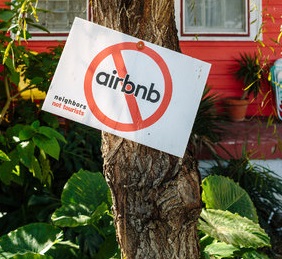Star-Advertiser
Editorial – Island Voices
By Reverend Bob Nakata of the Faith Action for Community Equity, Victor Geminiani of Hawai‘i Appleseed Center for Law and Economic Justice, and Rene Berthiaume of Hawaiihousing.org
February 12, 2017
Airbnb is a $30 billion behemoth whose business model has depended on ignoring local regulations in the name of growth and profit. It claims the number of vacation rentals in Hawaii is minuscule compared with the total number of housing units, but in fact, that total number is irrelevant. The appropriate comparison is how many units are needed to house our residents.
A recent report by the state Department of Economic Development and Tourism determined Hawaii will need 65,000 more homes by 2025.
That estimation is similar to the Hawaii Housing Finance and Development Corporation’s (HHFDC)’s projection that between 2015 and 2020, we have a housing shortage of 29,500 units. The Hawaii Tourism Authority estimates over 27,000 vacation rentals in the state are advertised online. The overwhelming number of these rentals are illegal. Every home used illegally as a visitor lodging business is one less home for our residents.
In tight housing markets with low vacancy rates, any reduction in supply naturally increases rents, particularly because neither the market nor the public sector can quickly add to housing stock. Airbnb indirectly reduces the affordable housing supply by reducing the overall housing supply of units available for long-term rentals.
A recent HHFDC report indicated an alarming drop in rental listings over the last three years for both multi-family and single-family units on all islands. In some areas, advertised rental housing listings have dropped by 80 percent, with the number of single-family listings in Kauai at less than 10 percent of the number available three years ago.
Another recent study by Honolulu’s Office of Community Services indicated that at 80 percent of occupancy, the average Airbnb unit in 2015 would bring in about 3.5 times more than for a long-term rental to local residents.
Now more than ever, we need state and county cooperation to ensure any housing, whatever the number of units, stays as residential. We need to encourage landlords to rent to residents trying to find affordable housing, rather than incentivize them to convert units to vacation rentals.
Airbnb lodgings are often concentrated in affluent neighborhoods that have long been gentrified, but are increasingly moving to areas often seen as local low-income housing. Last year, Airbnb solicited homeowners in Ewa Beach and Waianae to turn their houses into vacation rentals by direct-mailing postcards to residences. Increasingly, our beaches and public lands are being advertised on the site.
Airbnb claims that the majority of its rentals are only occasionally rented out and that low occupancy rates imply property owners are using the rentals as their residence. A close analysis shows a different picture. The majority of Airbnb’s lodging units are entire home rentals on Oahu that are being advertised as available year-round. While Airbnb portrays its owner-occupied units as a room or even a sofa that is occasionally rented, the vast majority are cottages, attached apartments and studios that could be rentals for residents.
Airbnb also claims that if allowed to collect the transient accommodations and general excise taxes from its short-term rentals, that would significantly increase tax revenue for the state. This is highly questionable. A 2015 San Francisco Office of Economic Analysis study found that for every 1,000 units lost to illegal short-term tourist rentals, the city’s economy loses more than $250 million each year, far exceeding benefits from taxes from visitor spending and vacation rentals. The loss of revenues comes via people dislocated due to unavailable housing.
The same factors would occur for Hawaii. In addition, taxes would still be collected by legitimate visitor lodging businesses and by owners collecting rents for long-term rentals to local residents.
Airbnb is distorting the truth to promote its financial interests. While some vacation rentals are not necessarily bad, the proliferation of TVUs brought about by online business models are taking away long-term units from our housing stock and harming our residents.
Reverend Bob Nakata of the Faith Action for Community Equity, Victor Geminiani of Hawai‘i Appleseed Center for Law and Economic Justice, and Rene Berthiaume of Hawaiihousing.org picked apart Airbnb’s report that claims illegal vacation rentals are “immaterial” to Hawaii’s residential housing market.




